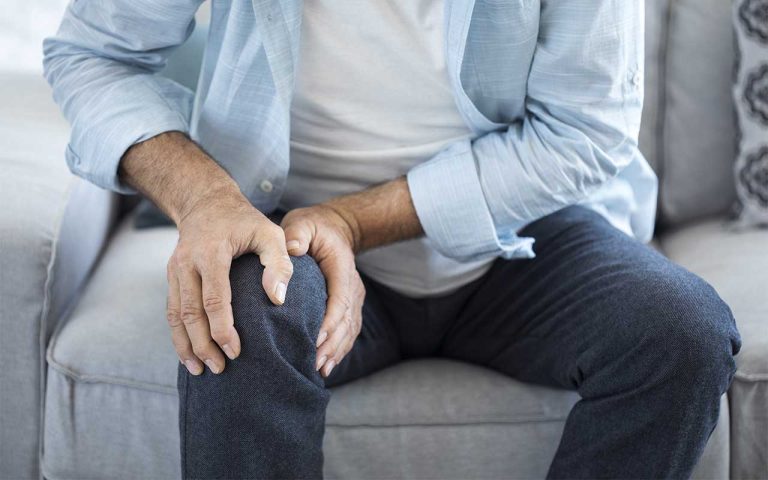Alcohol Abuse & Joint Pain

Recent research suggests that a small degree of alcohol consumption may be of some benefit to those with arthritis, painful inflammation, and stiffness of the joints.
However, alcohol abuse and overconsumption does not yield these beneficial effects and can contribute to joint pain and discomfort in a wide variety of ways.
Potential Benefits Of Drinking Alcohol For Joint Pain
A 2018 study related to methotrexate (a leading arthritis medication) and alcohol consumption showed that there were no negative health impacts, and no signs of liver damage in particular, among patients who drank small amounts of alcohol (less than one ounce of liquor, a glass of wine, or a pint of lite beer each day).
This is important because, at low or moderate doses, alcohol may act as an anti-inflammatory, helping to directly reduce body and joint inflammation and lowering pain and stress levels across your entire body.
This theory is directly supported by research demonstrating that both the risk and severity of rheumatoid arthritis is lower among those who consume low to moderate amounts of alcohol.
Harmful Side-Effects Of Alcohol Abuse On Joint Pain
When alcohol is abused and over consumed these potential benefits are lost, replaced by a variety of negative health effects that put heavy drinkers at a higher risk of developing joint pain.
Inflammation
Chronic heavy drinking is known to damage both gut and liver function. As these organs are put under stress, the body responds by increasing inflammation response across your entire body.
This non-specific heightened level of inflammation is marked by:
- dilated (expanded) blood vessels
- increased immune cell activity
- redness
- heat
- heightened sensations of pain, including joint pain
Long-term inflammation is associated with increased risk of heart disease, diabetes, cancer, bowel diseases, dementia, and arthritis/joint pain.
Dehydration
Alcoholic drinks are diuretics, which means that heavy drinking will cause serious dehydration—a common and well-known symptom of hangovers.
Dehydration can cause or heighten joint pain due to the loss of water in the joint cartilage of your body. As you dehydrate, your joints lose a portion of their liquid lubrication, impeding function and causing pain signals to begin traveling towards the brain.
Poor Sleep Quality
While heavy or moderate drinking can make you drowsy or calm you down after a long stressful day, alcohol is known to greatly reduce sleep quality and duration—especially after heavy drinking.
Chronic alcohol abuse can extend these negative effects, interfering with sleep quality for years at a time and severely interfering with the body and mind’s ability to recover and repair from minor harms on a day-to-day basis.
Over time, this effect can reduce healing performance and contribute to ongoing joint pain as a result of injury or other disorders.
Poor Self Care
Alcohol use disorder is a serious medical condition that can impact every facet of your day-to-day life. This includes exercise, posture, weight/obesity, and nutrition, each of which plays a part in determining your overall health ability to move, including your joint function.
Inflammatory arthritis and joint pain are simply more likely to develop as long-term alcohol abuse has an impact on your overall physical and mental state.
Harmful Interactions
While it has been demonstrated that low-level alcohol consumption does not appear to cause liver damage among those taking methotrexate and other arthritis medications, large doses of alcohol are another matter.
Heavy alcohol use, arthritis medications, over-the-counter painkillers like acetaminophen, and nonsteroidal anti-inflammatory drugs (NSAIDs, including ibuprofen and Aleve) are all known to elevate liver enzymes and damage the organ, especially when taken together.
If this damage goes too far it can potentially contribute to serious health problems and liver disease including steatosis, alcoholic hepatitis, fibrosis, cirrhosis, and liver cancer.
Recovery From Alcohol Abuse
While a drink a day may be helpful for some with joint pain or difficulty moving, compulsive heavy drinking to self-medicate against physical pain, depression, or withdrawal symptoms is another matter.
If you or a loved one struggles to control or stop problematic drinking, or experience negative physical, mental, or social effects due to substance abuse, a professional treatment program can give you a real path to lasting recovery and improved quality of life.
To learn more, contact Ark Behavioral Health today.
Written by Ark Behavioral Health Editorial Team
©2024 Ark National Holdings, LLC. | All Rights Reserved.
This page does not provide medical advice.
CreakyJoints/Global Healthy Living Foundation - Alcohol and Arthritis: Effects of Alcohol Consumption on Arthritis
National Institute on Alcohol Abuse and Alcoholism - Alcohol's Effects on the Body
National Institute on Alcohol Abuse and Alcoholism - Understanding Alcohol Use Disorder
Oxford Academic: Rheumatology - Alcohol consumption is inversely associated with risk and severity of rheumatoid arthritis

Questions About Treatment?
Ark Behavioral Health offers 100% confidential substance abuse assessment and treatment placement tailored to your individual needs. Achieve long-term recovery.
100% confidential. We respect your privacy.
Prefer Texting?
Our friendly support team is here to chat 24/7. Opt out any time.







 Learn More
Learn More








